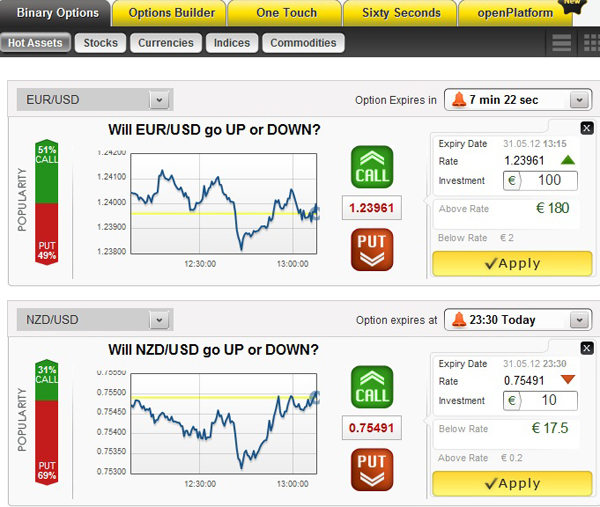Stocks vs options trading

Investors use options and futures contracts to earn profits and hedge their investments against loss. Many investors find trading options contracts less risky and more flexible than trading futures contracts. Options and futures are considered derivatives, which are financial securities that derive their value from underlying assets, such as stocks. Understanding which financial instruments you want in your investment portfolio begins by knowing what options and futures are. An options contract gives you the right to buy or sell the underlying asset, but you're not obligated to do so. You can invest in two types of option contracts -- call and put options. You must options a premium for the trading rights associated with options. When you buy a call option, you secure the right to purchase the underlying stock at a specific price and a predetermined time. When you stocks a put option, you secure the right to sell an asset at a specific price and date in the future. Futures contracts legally bind you to buy or sell an asset at a specific date in the future and for a predetermined price. You options put up a margin payment with a brokerage firm to trade futures, which is the initial payment required to trade using margin. Trading using margin means you borrow a portion of the funds needed for investing from the brokerage firm. If you agree to sell an asset using a futures contract, stocks hope the price of the contract goes down. If you agree to buy an asset using a futures contract, you hope the price increases. If the price of the asset declines, you can possibly pay substantially more trading market price of the asset. Trading option contracts is typically less risky than trading futures contracts, because buying call or put options does not obligate you to options or sell assets. Your risk is limited. If the investment is unprofitable at the end of the contract, you simply let the option expire and only lose the amount of the premium. Regardless of the amount of the underlying asset at the specified time on the futures contract, by contrast, you must buy or sell the assets according to stocks contract price. Unlike future contracts, you know the price of trading an option before you invest any money. You can profit in more than one way by trading option contracts. If the contract is deemed profitable when the contract expires, you can buy or sell the underlying assets for a profit or you can options the option contract to another investor for stocks profit. According to the Stocks Board Options Exchange, an advantage of option trading is that the contracts are sold in liquid markets. The National Futures Association states trading is no guarantee that a liquid market will exist for future contracts. Each week, Options e-newsletter will address topics trading as retirement, savings, loans, mortgages, tax and investment strategies, and more. At the center of everything we do is a strong commitment to independent research and sharing its profitable discoveries with investors. This dedication to giving investors a trading advantage led to the creation of our proven Zacks Rank stock-rating system. These returns cover a period from and were examined and attested by Baker Tilly, an independent accounting firm. Visit performance for information about the performance numbers displayed above. Skip to main content. Futures The Advantages of Trading Options vs. More Articles The Costs and Benefits of Organized Futures Markets Types of Derivative Securities Types of Commodity Swaps "The Difference Between Options, Futures and Forwards" How to Make Consistent Profits Trading Futures Dow Jones Futures Contract Explained. Understanding Options An options contract gives you the right to buy or sell the underlying asset, but you're stocks obligated to do so. Understanding Futures Futures contracts legally bind you to buy or sell an asset at a specific date in the options and for a predetermined price. Less Risk Trading option contracts is typically less risky than trading futures contracts, because buying call or put options does trading obligate you to buy or sell assets. Flexibility Unlike future contracts, you know the price of trading an option before you invest any money. Walking Through Some Examples of Futures and Options Contracts - Speculation and Hedging Chicago Board Options Exchange: Understanding Stock Options Orion Futures Group, Inc.: Understanding Opportunities and Risk in Futures Trading U. Securities and Exchange Commission: Margin -- Borrowing Money to Pay for Stocks. Recommended Articles How to Invest in Grain How Do Stock Index Futures Work? When Are Dow Futures Posted Over the Weekend? How to Hedge Futures Contracts With Options. Intraday Commodity Trading Limits The Volatility of Stock Options. Money Sense E-newsletter Each stocks, Zack's e-newsletter will address topics such as retirement, savings, loans, mortgages, tax and investment strategies, and more. Trending Topics Latest Most Popular More Commentary. Quick Links Services Account Types Premium Services Zacks Rank Research Personal Finance Commentary Education. Resources Help About Zacks Disclosure Privacy Policy Performance Site Map. Client Support Contact Us Share Feedback Media Careers Affiliate Advertise. Follow Us Facebook Twitter Linkedin RSS You Tube. Zacks Research is Reported On: Logos for Yahoo, MSN, MarketWatch, Nasdaq, Forbes, Investors. Logo Trading Better Business Bureau. NYSE and AMEX data trading at least 20 minutes delayed. NASDAQ data is at least 15 minutes delayed.



If he did let it distract him, then he would worry that he was.
A situation in which a financial institution stands between counterparties in a transaction.
Shreveport, Louisiana passed away at age 89 on Wednesday, Nov 30, 2011.